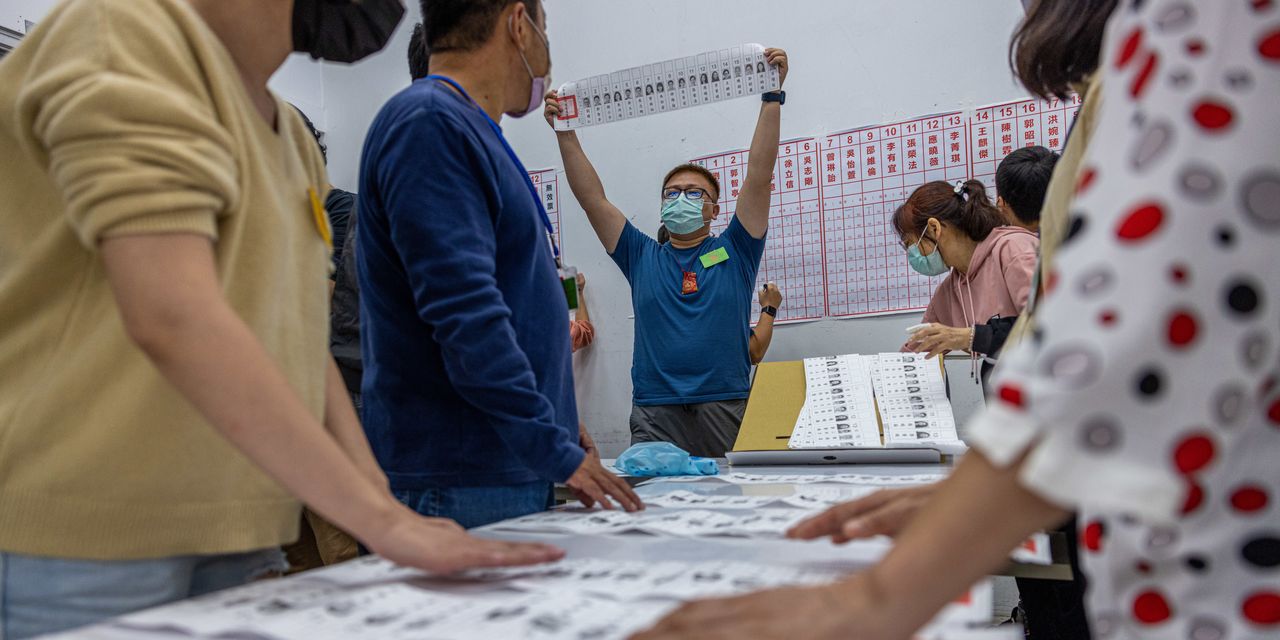Taiwan—a central issue in the historically tense U.S.-China relations—is set to hold elections early next year that may be the most unusual the country has ever seen, with direct implications for America’s politics and economy.
The unexpected insurgence in Taipei last week of a Beijing-friendly third party has shaken decades of Taiwanese politics, which until now has been a two-party system.
Taiwan, a self-ruled island off the coast of China that Beijing considers a runaway province, is not formally recognized in the international community. But its closest ally is Washington, which for years has provided it with billions of dollars of arms in the event of a China invasion.
The U.S. has long refrained from saying it would definitely send troops to defend the island in such a case, though President Joe Biden, famous for his off-the-cuff remarks, has repeatedly broken with precedent and said he would send troops, even as the administration stresses its policy toward Taiwan hasn’t changed.
Dominating Taiwanese politics are relations with China, the U.S., and Taiwan’s globally coveted semiconductor chips, which are at the heart of Washington’s tech war with Beijing.
U.S. tech restrictions have hurt Beijing’s access to many advanced chips. Yet at the same time, powerful figures within the Biden administration are arguing that restricting Beijing’s access to chips isn’t enough. The U.S. needs its own chip industry to reduce reliance on other countries, particularly one Beijing could potentially take over.
One Taiwanese firm,
Taiwan Semiconductor Manufacturing
(ticker: TSM), makes roughly 60% of the world’s semiconductors and nearly all of the most advanced ones. They are arguably the most vital component of many sophisticated military, supercomputer, and communications devices. Their role in AI is becoming indispensable.
The U.S. can somewhat restrict Taiwan Semi sales to China partially because of the strong U.S. relations with Taiwan’s Democratic Progressive Party, or DPP, and because the firm uses a small amount of American components. But Taiwan Semi has sought to avoid the restrictions by producing chips in Arizona, where it has a small operation it is seeking to expand.
Regardless, the restrictions have adversely affected U.S. chipmakers such as
Nvidia
(NVDA), which gets significant revenue from China. But recently passed legislation to support American chipmakers seeks to offset that damage. China has sought retribution by banning purchases of memory chips from U.S. firm
Micron Technology
(MU).
Taiwan’s importance in Sino-American relations was on full display last week when U.S. Secretary of State Antony Blinken visited Beijing and met with Chinese President Xi Jinping. He covered a range of issues, including expressing displeasure with China’s recent aggressive military maneuvers around Taiwan and violation of its airspace.
But he repeatedly reminded the top Chinese leadership that the U.S. doesn’t support Taiwan independence. Though Blinken was expressing a decades-long U.S. policy, it drew backlash among Republicans, even though that party officially opposes Taiwan independence as well.
“Xi Jinping has a nose for U.S. weakness,” John W. Garver, emeritus professor at Georgia Tech and a specialist on U.S.-China relations told Barron’s. He cited China’s bigger and more modern navy than that of the U.S., crumbled alliances under former President Donald Trump, and the revival of isolationism in the Republican party as a sliver of China’s seizing of an empire in decline.
Campaigning is well underway for Taiwan’s presidential and legislative elections in January. Recent polls put the DPP a few points ahead of the Beijing-friendly Kuomintang, or KMT. But last week something happened that was previously unseen in Taiwan’s two-party system. A third party has seized momentum as the DPP and KMT deal with scandals. The once-obscure Taiwan People’s Party, or TPP, is currently ahead of the KMT by roughly two percentage points, within the margin of error of the incumbent DPP.
Rory Green, chief China economist at Lombard Green wrote in a note to clients that “while it is too early to call the election result,” a DPP win is likely to “increase cross-strait tensions” while a victory for KMT or TPP “would slow the pace of U.S. Taiwan engagement.”
As the TPP is also considered far more accommodating to Beijing than the DPP, there are now two parties polling well who would likely reduce tensions with Beijing, and be more likely to lessen chip sales. That could have a range of implications—politically, militarily, and economically.
“If the TPP or KMT wins in 2024, the U.S. chip ban will fail. And China will enhance its influence over Taiwan,” said Austin Wang, a professor of political science at the University of Nevada, Las Vegas, and an expert on U.S.-Taiwan-China relations.
“U.S. high-tech companies who still invest in China may benefit from it temporarily, but it is likely that China will develop its own products in the long run,” he told Barron’s.
Write to [email protected]
Read the full article here





